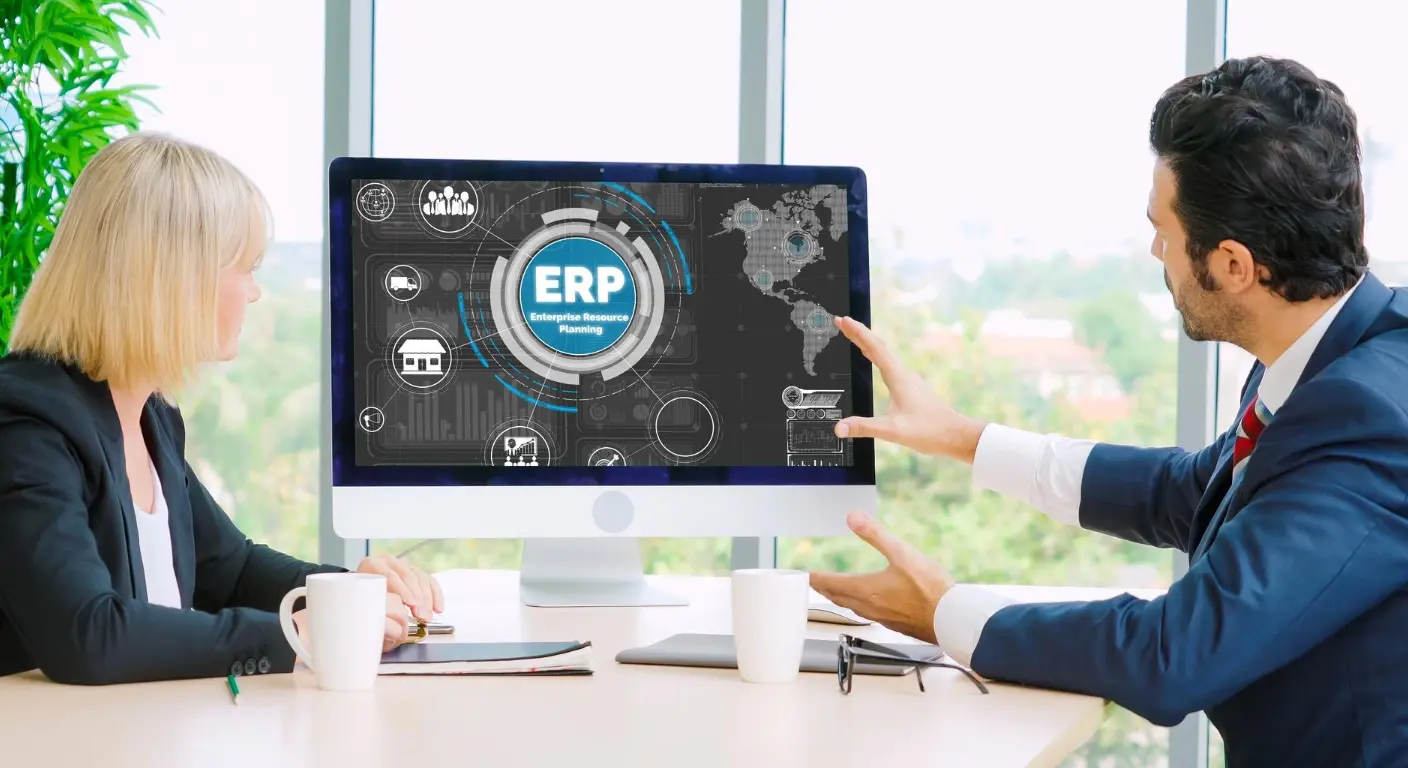

Independent ERP consulting: How to find the best advice for your company

Are you looking for the best solution for your ERP system and want ...
Are you looking for the best solution for your ERP system and want independent advice?
Independent ERP consulting offers you objective recommendations without any ties to specific providers. Independent consultants analyze your business needs and help you choose the best software. In this article, we show you why independent ERP consulting is important and how it can help you specifically.
The most important facts at a glance
-
Independent ERP consultants provide objective, unbiased advice tailored specifically to the needs of the business.
-
A structuredapproach to ERP selection, including the creation of a detailed specification, is crucial to the success of the project.
-
Long-term support and continuous optimization by ERP consultants are important to ensure the efficiency and adaptability of the system.
Why independent ERP consulting is crucial to help you choose the right ERP system.

The independence of ERP consultants is invaluable for companies that need objective and unbiased advice. Independent ERP consultants offer:
-
No ties to specific vendors
-
The ability to recommend the best solutions for a company's specific needs
-
Objectivity that ensures all options are considered
-
Support in making the best possible decision
Another important aspect of independent ERP consulting is the systematic analysis of complex requirements. Independent consultants help to minimize the risks in ERP projects by thoroughly analyzing and structuring the company's requirements. This leads to better-informed decisions and a higher probability of a successful project outcome. In our project work, we find time and again how valuable the contributions of individual project participants are when they can be taken up by an experienced ERP consultant and incorporated into requirements.
We sometimes experience interesting "aha" moments when we introduce best practice ideas and examples from other companies or industries in an interdisciplinary way as part of Dreher Consulting. This dialog often results in a fruitful discussion that leads to a better process design.
In addition, independent ERP consulting brings a fresh, new and different perspective to company processes. Often internal teams are so immersed in their daily processes that they lose sight of opportunities for improvement. (regardless - is the core business of your project participants the development of new, innovative processes?) Independent consultants can uncover these blind spots and propose innovative solutions that move the company forward.
Advantages of independent ERP consulting
Working with independent ERP consultants offers numerous advantages:
-
Significant time savings when implementing an ERP system.
-
Independent consultants bring a wealth of experience to the table.
-
Use of best practice approaches that can speed up the implementation process and make it more efficient.

Another benefit is access to proven methods for optimizing operational business processes and corporate planning. Independent ERP consultants use these approaches to ensure that the ERP system meets the company's specific requirements while increasing efficiency and productivity.
In addition, independent consultants provide an objective view of the company's needs. They help avoid bad decisions by providing an unbiased evaluation of the available options and recommending the best solution. This objectivity is particularly important to ensure that the ERP system serves long-term business goals and not just short-term requirements.
The process of ERP selection with independent consultants
A structured and targeted selection process is crucial to ensure that the ERP system meets the specific business requirements. The following points are important:
- Working with independent consultants to make the process systematic and methodical
- Creating a detailed requirements catalog (specification sheet) that defines the company's specific needs
- Using the requirements catalog as the basis for the selection process
The selection process comprises several steps, including the creation of a requirements specification, the comparison and evaluation of ERP systems, as well as the decision-making process and vendor selection. In the following sections, we will look at these steps in detail to give you a comprehensive understanding of the process.
Creating a specification sheet
A detailed specification is the heart of the ERP selection process. It serves as the basis for the subsequent procurement and implementation of the ERP system and ensures that the company's requirements are clearly defined and comprehensibly formulated. A well-drafted specification helps to avoid misunderstandings and ensures that everyone involved is on the same page.
The creation of a requirement specification begins with a thorough analysis of the business processes. This analysis is crucial to define the specific requirements of the ERP system and ensure that all relevant criteria are taken into account.
A clearly formulated specification also provides an efficient functional definition and helps to establish clear criteria for the selection of the ERP provider.
Comparison and evaluation of ERP systems
Comparing and evaluating ERP systems is another important step in the selection process. Benchmarking makes it possible to compare the performance of different ERP systems on the basis of specific, defined criteria. These criteria are based on a detailed specification sheet and enable a well-founded decision to be made.
Independent ERP consultants provide access to proven best practice methods that reduce the risk of wrong decisions. Through a comprehensive comparative analysis, companies can ensure that the chosen ERP system meets their specific requirements and delivers the desired results.
Decision making and vendor selection
Decision making and vendor selection are crucial steps in the ERP selection process. With external advice, companies can benefit from objective evaluations and recommendations, making the decision-making process easier. The choice of an ERP provider should be based on sound data in order to make the best possible decision.
A detailed specification sheet provides objective functional criteria to support the decision-making process. Independent consultants help to identify the best providers and ensure that the chosen solution serves the company's long-term business goals.
Successful implementation with independent ERP consultants
The support of an ERP consultant can significantly speed up the implementation process while conserving internal resources. Companies benefit financially from the expertise of an ERP consultant as they help to avoid unnecessary costs during software selection and implementation. External ERP consultants bring specialized expertise that makes implementation more efficient and leads to faster success.

An independent ERP consultant provides objective recommendations that are not influenced by the interests of a particular vendor. This ensures that the best solution is selected for the company's specific needs. Employee training is also crucial to ensure that the new ERP system is used effectively.
Clear communication between the ERP consultant and the internal team is essential for implementation success. Successful ERP implementations involve not only training, but also long-term strategic support from experts. Make sure that the consultant recommends different ERP vendors and does not always suggest the same solution for different projects to ensure customer focus.
Continuous optimization and support
Long-term post-implementation support is critical to identify and resolve issues early. After implementation, ERP consultants provide ongoing support to resolve issues and ensure the system is working effectively. This ongoing support helps to increase the efficiency of business processes and optimize workflows.
Independent ERP consultants play a crucial role in the ongoing improvement of ERP systems by:
- Continuous monitoring and adjustments
- Regular assessments to measure system performance and identify optimization opportunities
- Adapting to changing business requirements and taking appropriate action
Flexibility and support from the consultant during implementation and beyond are also important criteria. This ongoing support ensures that the ERP system delivers the desired benefits in the long term and adapts to changing business requirements.
Common challenges and solutions

The selection and implementation of ERP systems often presents challenges. One of the most common difficulties is rising costs, often due to unclear project requirements and poor planning. To overcome this challenge, it is important todefine clear requirements and create a detailed project plan.
Another common problem is the lack of acceptance within the team during implementation, which can lead to chaos and severely compromise the benefits of the ERP system. One solution to this is to involve employees in the process at an early stage and provide comprehensive training.
Another common problem is the lack of acceptance within the team during implementation, which can lead to chaos and severely impairs the benefits of the ERP system. One solution to this is to involve employees in the process at an early stage and offer comprehensive training.
Companies often miss the opportunity to optimize processes if they do not have thoroughly defined workflows prior to ERP implementation. A thorough analysis and optimization of business processes prior to implementation can solve this problem.
Case studies of successful ERP projects
Case studies of successful ERP projects provide valuable insights into the benefits of independent ERP consultancy. One example is Itransition's support of a telecommunications company that doubled its efficiency in managing work orders by developing an Odoo-based business process automation solution. Furthermore, this ERP project demonstrates the importance of customized solutions.

Another example is a maintenance service provider that was able to reduce manual tasks by 80% and speed up the approval of orders by using an ERP system from Itransition. This case study implementation shows how independent ERP consultancy can lead to significant improvements in efficiency and cost reductions.
They also illustrate how tailored solutions can meet a company's specific needs and deliver long-term benefits.
Tips and checklist for choosing the right ERP consultant
The selection of the right ERP consultant is crucial for the success of an ERP project. It is important to:
-
Checking the ERP consultant's references to determine if they have experience in your specific industry.
-
Requesting the consultant's CV to identify their previous experience and possible bias.
-
Pay particular attention to whether the consultant has previously worked for an ERP vendor.
The selection of an ERP consultant should be based on their experience and proven success in similar projects. It is also advisable to consider the opinions of previous clients to assess the reliability of the consultant. In addition, professional erp consulting support can provide valuable insights.
An important aspect is the independence of the consultant to ensure objective advice. Candidates should be able to present a clear methodology and structured approach to the selection process. The consultant should be able to offer customized solutions that are adapted to the specific needs of the company.
Summary
The right independent ERP consultancy offers numerous benefits, including objectivity, time savings and access to best practice approaches. A structured selection process and the support of experienced consultants are critical to the success of an ERP project. Use these insights to find the best consultancy for your business and achieve long-term success.
Frequently asked questions 5 tips for direct use
Die Unabhängigkeit von ERP-Beratern ist entscheidend, da sie eine objektive Beratung ermöglicht, die unabhängig von den Interessen eines spezifischen Anbieters ist. Dies führt zu fundierteren Entscheidungen und optimalen Lösungen für das Unternehmen.
Eine unabhängige ERP-Beratung bietet bedeutende Vorteile durch Zeitersparnis, Zugang zu bewährten Methoden und eine objektive Einschätzung der Unternehmensbedürfnisse, was dazu beiträgt, Fehlentscheidungen zu minimieren.
Ein Lastenheft ist entscheidend für die ERP-Auswahl, da es die spezifischen Anforderungen präzise festlegt und somit Missverständnisse während des Auswahlprozesses verhindert. Dies führt zu einer zielgerichteten und effizienten Entscheidung.
Häufige Herausforderungen bei der ERP-Implementierung sind unklare Projektanforderungen, die zu steigenden Kosten führen, sowie fehlende Akzeptanz im Team und unzureichend definierte Geschäftsprozesse. Es ist wichtig, diese Aspekte frühzeitig zu adressieren, um den Erfolg des Projekts sicherzustellen.
Um den richtigen ERP-Berater auszuwählen, sollten Sie dessen Referenzen überprüfen, auf Unabhängigkeit sowie Erfahrung in ähnlichen Projekten achten und sicherstellen, dass er eine klare Methodik sowie maßgeschneiderte Lösungen bietet. Diese Kriterien gewährleisten, dass der Berater Ihre spezifischen Anforderungen optimal erfüllt. Achten Sie darauf, dass er seine Methodiken klar darlegt und die Erfahrung in der Projektumsetzung für Ihr ERP-Projekt auch eingesetzt wird.


/Herr_Dreher_500x500.jpg)




